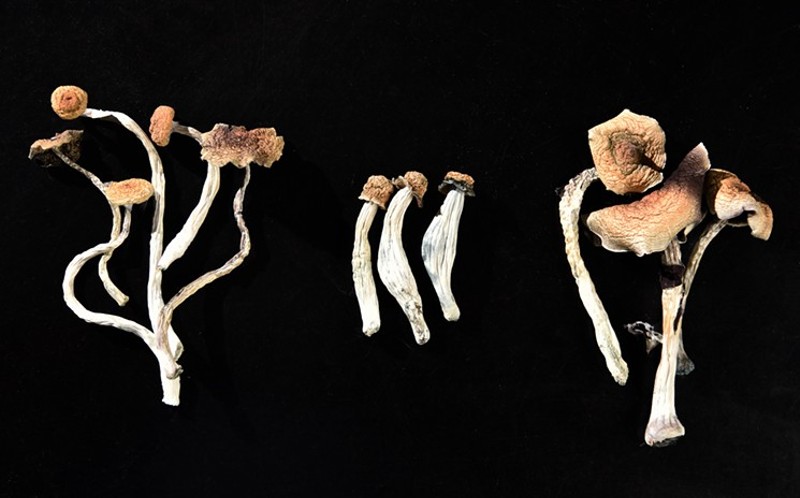Three years after Denver voters made the Mile High City the first American municipality to decriminalize psychedelic mushrooms, fungi advocates are back at it, pushing the Natural Medicine Health Act on the statewide ballot.
The measure would create a 21+ legal-access framework for psychedelic mushrooms by late 2024 while also immediately decriminalizing mushrooms, DMT, ibogaine and mescaline, excluding peyote. But it would create the possibility of building a legal-access framework for these other substances, too, by June 2026.
If approved by voters, the proposal would give the Colorado Department of Regulatory Agencies the authority to create a legal framework for psychedelics access. DORA would be charged with licensing "healing centers," where people could go to consume psychedelics for therapeutic purposes in a supervised setting. Facilitators would assist people in integrating what comes up during a psychedelics session; they'd be licensed by DORA, too, and could visit people at their homes or in approved medical-care facilities to facilitate psychedelics treatment.
The initiative would also lead to the establishment of a Natural Medicine Advisory Board, whose membership would be appointed by the governor and would potentially include individuals with expertise in natural medicine therapy, harm reduction and religious use of natural medicines, among other areas. Following recommendations from the Natural Medicine Advisory Board, DORA could legalize access centers for other decriminalized substances, such as DMT and ibogaine, in 2026.
New Approach PAC, a D.C-based drug-policy reform advocacy group, is pushing the measure, and has contributed over $3 million to the Natural Medicine Colorado campaign. The campaign hired Kevin Matthews, the person who led the successful Decriminalize Denver effort in 2019, to help get the Natural Medicine Health Act through.
“People suffering from mental-health issues will have access to an alternative treatment, which
has the potential to help them recover,” Matthews says.
Although decades of federal government propaganda have influenced the public perception regarding natural psychedelics, attitudes are shifting. Studies have shown that some psychedelics, such as psychedelic mushrooms, can have positive impacts on people struggling with mental health issues, including anxiety, depression and PTSD; campaign ads push those possibilities.
The measure has a wide range of opponents, though. In its ballot guide, the Christian, right-leaning Centennial Institute encourages a "no" vote, saying: "This is the first step to commercializing more illicit drugs in a state ravaged by drug use. This will make our communities worse."
"Drug prohibitionists who want to see this fail have not done their research," Matthews responds. "We know that natural medicines are safe and effective when combined with therapy, and most adults who
use natural medicines outside of clinical settings do so with intent in an informed and
structured way to self-treat their own mental and behavioral health issues.”
The measure also has a few unlikely foes. Some grassroots psychedelics advocates, including ones who worked on the Decriminalize Denver campaign, are opposed to 122. They say they don’t trust New Approach PAC and argue that full decriminalization of natural psychedelics should happen before a legal- access model is considered, pointing to the lack of equity and overcommercialization the Colorado cannabis market as pitfalls that should be avoided
Melanie Rose Rodgers and Nicole Foerster have been leading this opposition movement; they even pushed an unsuccessful competing ballot measure that sought to simply decriminalize natural psychedelics.
“Colorado should be cautious in creating a new industry for only the rich and wealthy to participate in,” says Rodgers. “This opens the door for the whole world to come here for another gold rush and exploit our state and create even more gentrification."
And in the run-up to the November 8 election, various indigenous individuals have come together to form the Native Coalition Against the Natural Medicine Health Act.
The coalition recently issued a lengthy statement in opposition to the measure. "It lacks inclusion of disproportionately impacted communities. The passing of Proposition 122 positions these natural medicines for extractivism, some of which are not Indigenous to Colorado, by those with limited understanding and knowledge of the medicines and their applications, which will ultimately create further inequities, criminalization and desecration of the sacred," the statement reads.
“It’s the whole political nature around the plant, and I feel like when you infuse money into that and when you infuse white saviorism into that, it’s going to stir up a bunch of stuff,” says the coalition's Kendra Soderberg. “This seems to be a rush to throw money at these medicines and I’m like, ‘What the heck is going on?’”
Matthews has an answer. “The Natural Medicine Health Act is designed to make these breakthrough treatments available for all Coloradans in a safe and structured way, based on the research," he says. "This is a for-healing measure that prioritizes equitable access and honors the legacy of the communities from which these natural medicines have been used for thousands of years in a way that makes sense.”
[
{
"name": "Air - MediumRectangle - Inline Content - Mobile Display Size",
"component": "12017618",
"insertPoint": "2",
"requiredCountToDisplay": "2",
"watchElement": ".fdn-content-body",
"astAdList": [
{
"adType": "rectangle",
"displayTargets": "mobile"
}
]
},{
"name": "Editor Picks",
"component": "17242653",
"insertPoint": "4",
"requiredCountToDisplay": "1",
"watchElement": ".fdn-content-body",
"astAdList": [
{
"adType": "rectangle",
"displayTargets": "desktop|tablet"
},{
"adType": "rectangle",
"displayTargets": "desktop|tablet|mobile"
}
]
},{
"name": "Inline Links",
"component": "18838239",
"insertPoint": "8th",
"startingPoint": 8,
"requiredCountToDisplay": "7",
"maxInsertions": 25
},{
"name": "Air - MediumRectangle - Combo - Inline Content",
"component": "17261320",
"insertPoint": "8th",
"startingPoint": 8,
"requiredCountToDisplay": "7",
"maxInsertions": 25,
"watchElement": ".fdn-content-body",
"astAdList": [
{
"adType": "rectangle",
"displayTargets": "desktop|tablet"
},{
"adType": "rectangle",
"displayTargets": "desktop|tablet|mobile"
}
]
},{
"name": "Inline Links",
"component": "18838239",
"insertPoint": "8th",
"startingPoint": 12,
"requiredCountToDisplay": "11",
"maxInsertions": 25
},{
"name": "Air - Leaderboard Tower - Combo - Inline Content",
"component": "17261321",
"insertPoint": "8th",
"startingPoint": 12,
"requiredCountToDisplay": "11",
"maxInsertions": 25,
"watchElement": ".fdn-content-body",
"astAdList": [
{
"adType": "leaderboardInlineContent",
"displayTargets": "desktop|tablet"
},{
"adType": "tower",
"displayTargets": "mobile"
}
]
}
]













